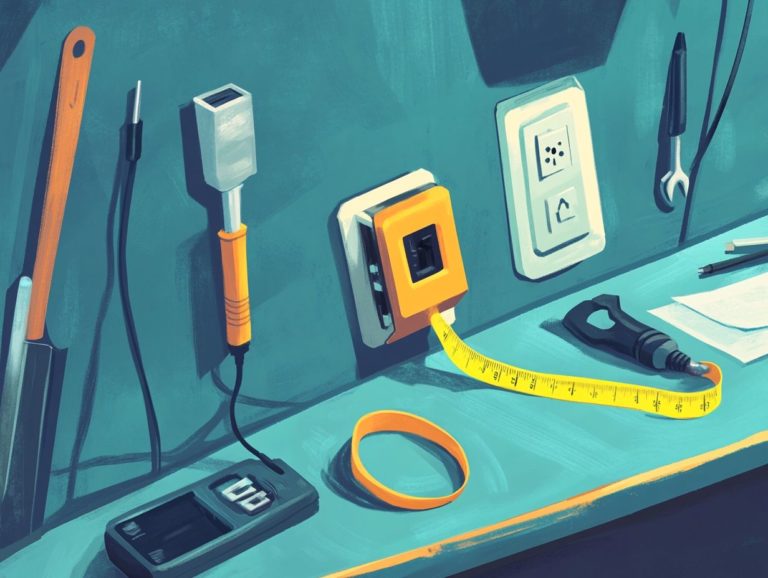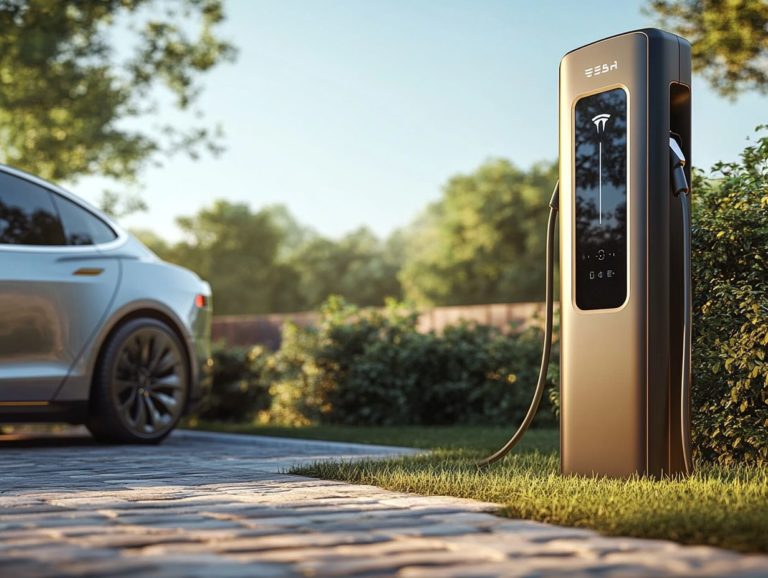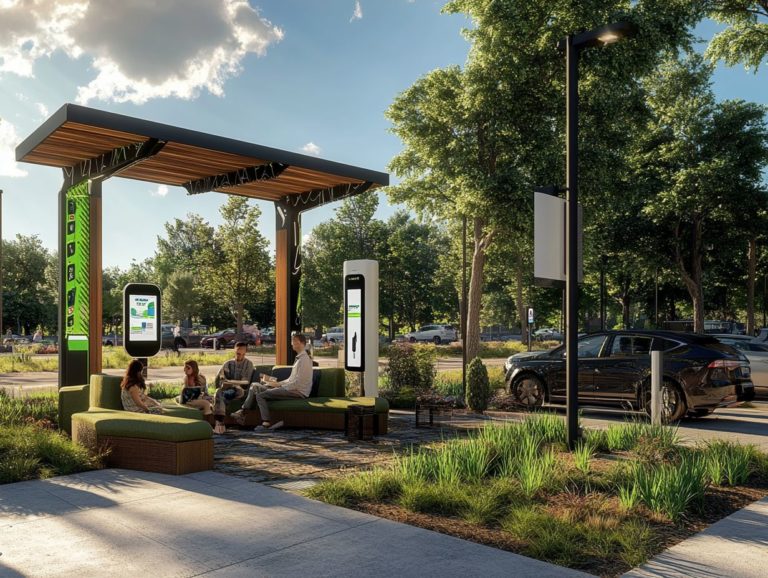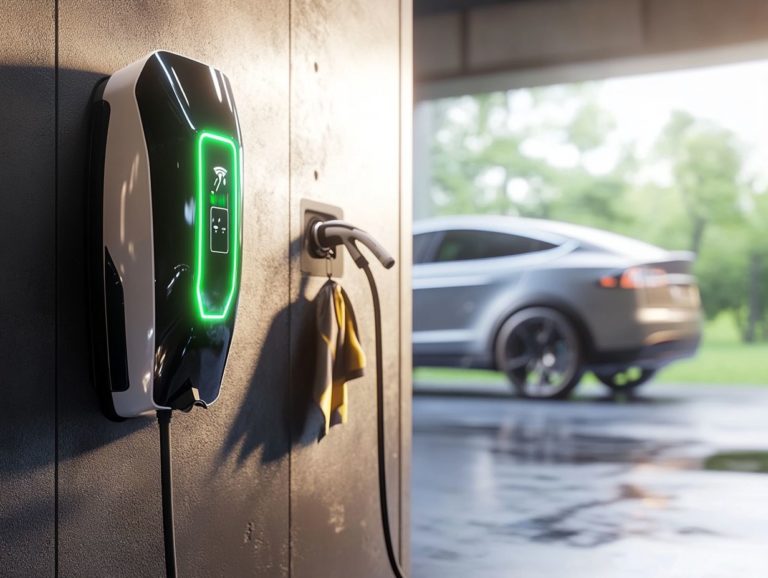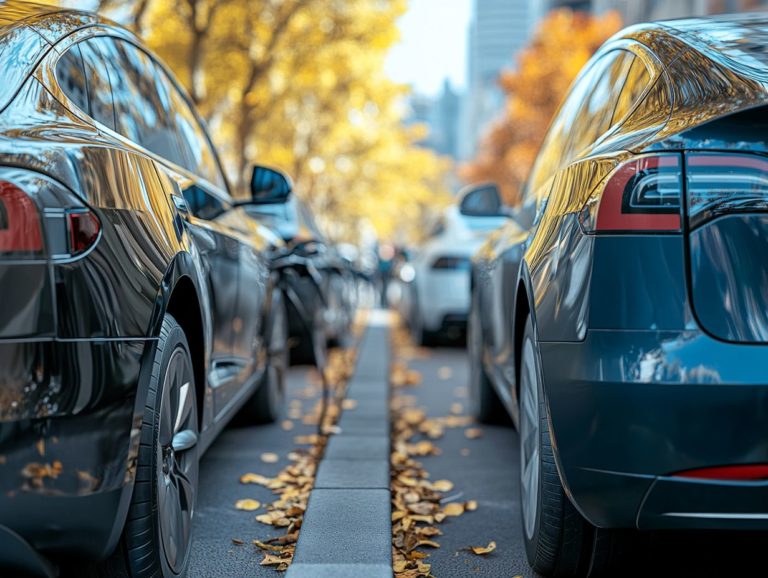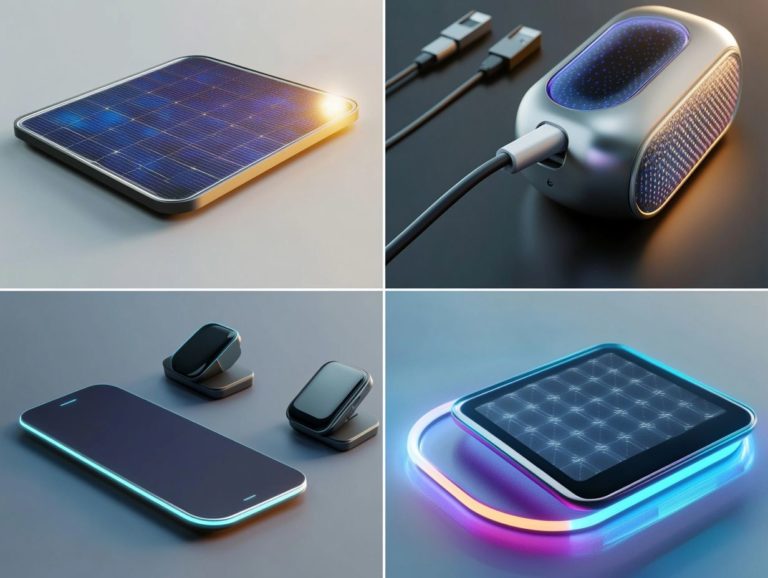The Benefits of Home EV Charging Solutions
Electric vehicles (EVs) are becoming more popular. As a driver, you need a reliable home charging solution.
This overview explores three main types of home EV chargers: Level 1, Level 2, and DC Fast Charging. Each option offers unique benefits that can enhance your driving experience.
You’ll learn about key factors to consider when choosing a charging solution and get tips for installation. Whether you want to do it yourself or hire a professional, you ll be ready to make the best choice for your needs.
Contents
- Key Takeaways:
- Benefits of Home EV Charging Solutions
- Types of Home EV Charging Solutions
- Factors to Consider when Choosing a Home EV Charging Solution
- How to Install a Home EV Charging Solution
- DIY vs. Professional Installation
- Step by Step Guide
- Frequently Asked Questions
- What are the benefits of a home EV charger?
- Are there any financial benefits to using a home EV charging solution?
- Can a home EV charging solution improve the charging speed of my electric vehicle?
- Do home EV charging solutions require any special installation or equipment?
- What are the environmental benefits of using a home EV charging solution?
- Can a home EV charging solution increase the resale value of my home?
Key Takeaways:
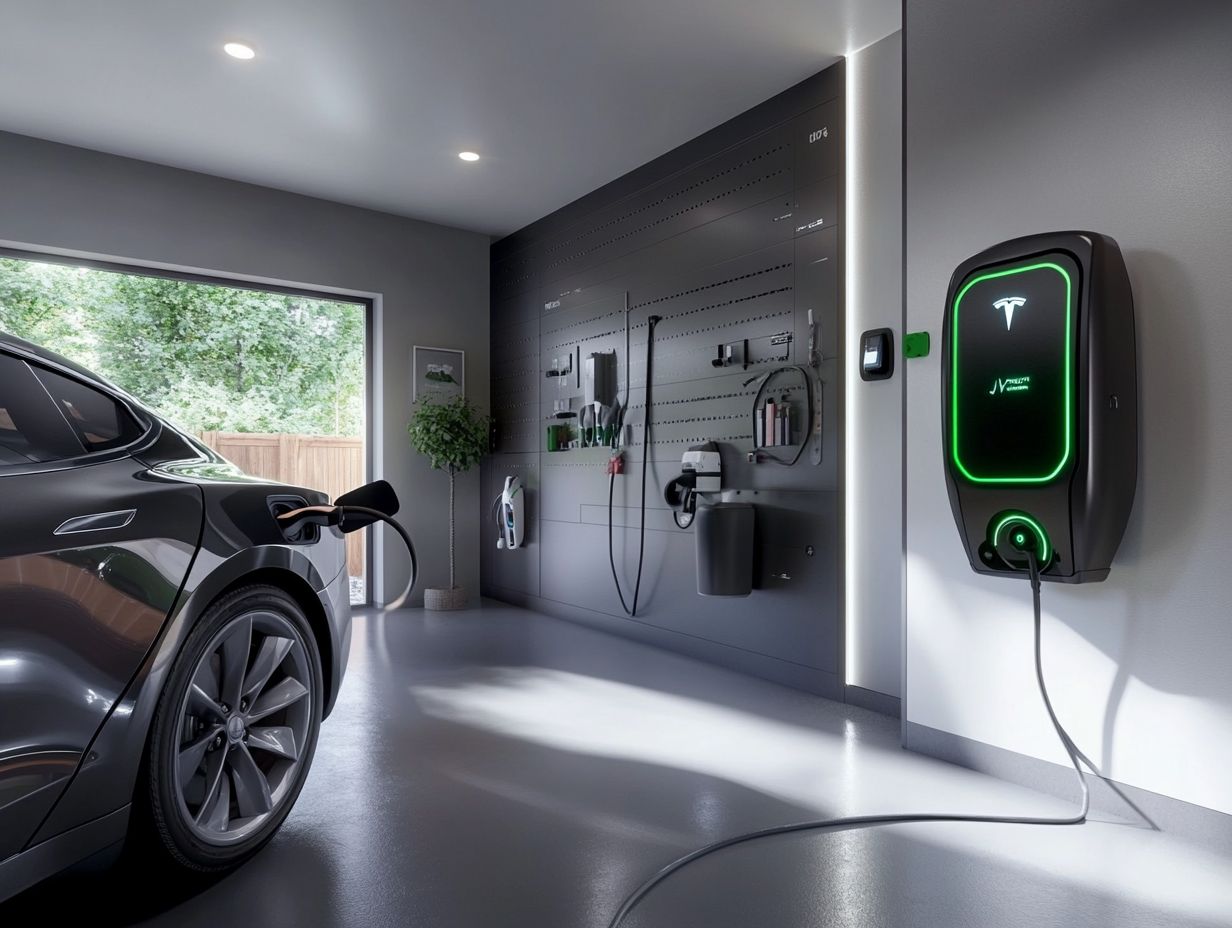
- Home EV charging solutions reduce emissions and support clean energy.
- Charging at home is convenient and cost-effective, eliminating trips to public stations.
- Consider vehicle compatibility, installation needs, and overall cost when selecting a home charger.
What are Home EV Charging Solutions?
Home EV charging solutions encompass systems that allow you, the electric vehicle (EV) owner, to charge your vehicle conveniently at home. These options include Level 1 chargers, which use a standard outlet, and Level 2 chargers, which require a dedicated circuit for faster charging.
As demand for electric vehicles grows, you have many choices, including reputable brands like ChargePoint. These chargers are designed for efficiency and user-friendliness.
Integrating a home EV charger not only enhances convenience but also helps reduce emissions and supports sustainable living.
The benefits of having a home EV charging station extend beyond convenience. You can charge your vehicle when it fits your schedule, often during off-peak hours, maximizing cost savings and energy efficiency. Understanding the impact of EV charging on home energy use can further enhance your decision.
For installation, you ll want a licensed electrician to ensure your home’s electrical system can handle the chargers. Incorporating renewable energy sources, like solar panels, can enhance your charging setup, decreasing your reliance on grid electricity.
This approach not only gives you control over your charging but also emphasizes the importance of a solid home infrastructure in supporting green transportation.
Benefits of Home EV Charging Solutions
Home EV charging solutions offer numerous advantages tailored to your financial and environmental goals as an electric vehicle owner. By utilizing solar power for EV charging, you can save on costs while charging at home, avoiding the hassle of searching for public charging stations and allowing you to power up during off-peak hours, taking advantage of lower charging rates.
These solutions also help reduce greenhouse gas emissions, aligning with the increasing focus on sustainable living. Don’t miss out on the substantial cost savings you’ll gain by opting for a home EV charger instead of relying solely on public networks; learn more about the benefits of driving an EV.
Consider making the switch to a home EV charging solution today and enjoy the convenience and benefits of networked charging stations it brings!
Environmental Impact
The environmental impact of home EV charging solutions is remarkably positive. They promote the adoption of renewable energy sources and drastically reduce greenhouse gas emissions.
By harnessing solar panels or wind turbines to power your home EV chargers, you can further minimize your carbon footprint while championing sustainable living. This shift leads to significant energy savings. A recent study revealed that households utilizing solar power for EV charging can save up to 70% on their electricity bills.
This practice also aligns with the global movement toward cleaner energy, and it enhances a reliable power supply during peak demand periods. Communities that have embraced shared solar programs enjoy additional benefits, such as increased social equity and lower energy costs for low-income families.
By embracing these innovative technologies, you play a vital role in a collective approach to sustainability that can profoundly influence regional energy consumption patterns.
Convenience and Cost Savings
The convenience of home EV charging is truly unparalleled! You can effortlessly charge your electric vehicle overnight without the hassle of seeking out public charging stations. For new EV owners, understanding the best charging solutions enhances your daily charging routine and leads to substantial cost savings in the long run.
By charging during off-peak hours, you can take advantage of lower utility rates, minimizing your overall charging expenses. Home EV charging solutions offer you exceptional flexibility and control, transforming the charging experience into a seamless affair.
Imagine wrapping up a long day at work and simply plugging in your vehicle as you head inside for the evening, secure in the knowledge that by morning, it will be fully charged and ready for your next adventure! This practical approach to home charging eliminates the need for time-consuming detours to public stations, allowing you to redirect that precious time toward family or personal interests.
The financial benefits can be significant. While public charging rates often fluctuate and can spike during peak hours, you, as a homeowner, can enjoy the stability of fixed electricity rates. In many cases, this can lead to hundreds of dollars in savings each year! Start your home charging journey today to save hundreds on electricity!
Types of Home EV Charging Solutions
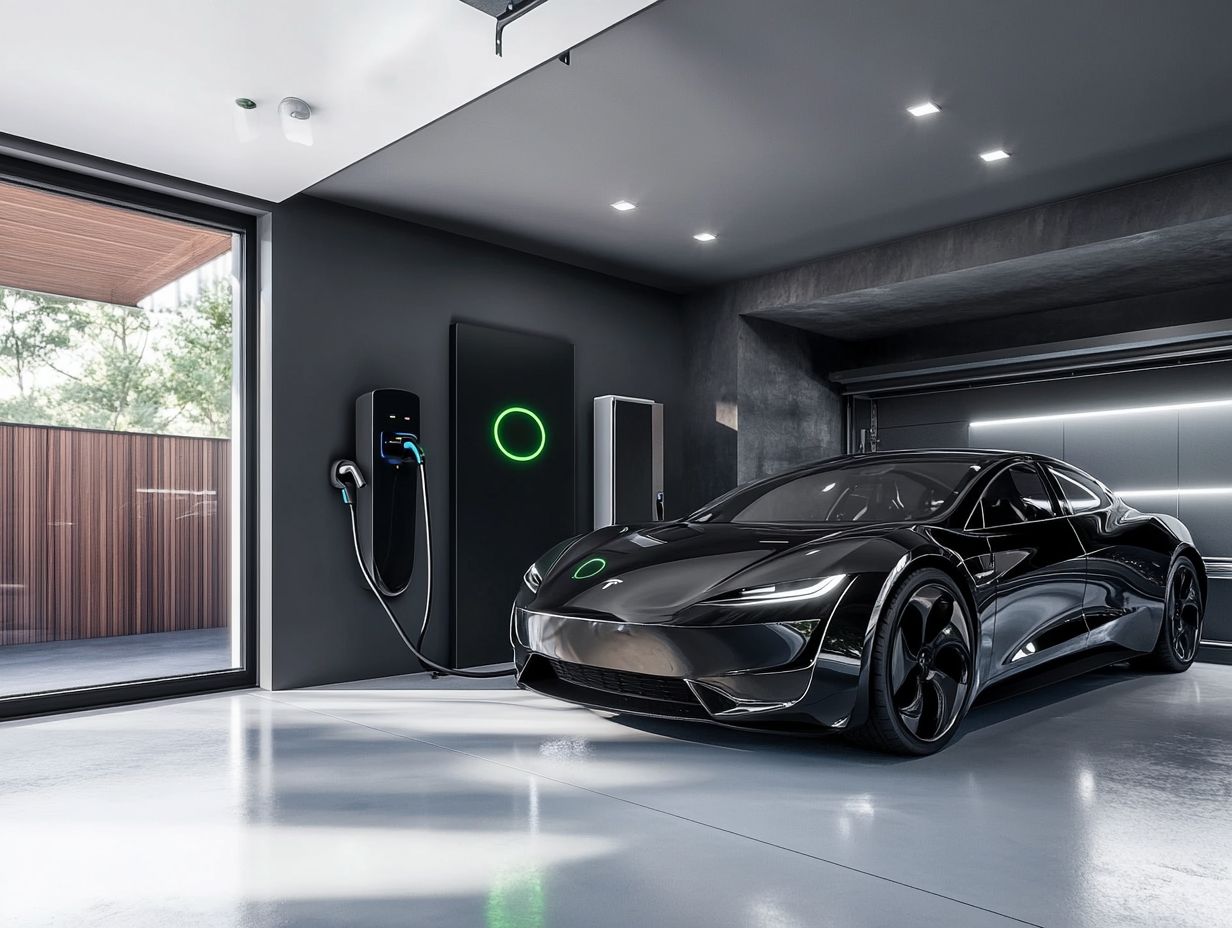
Home EV charging solutions fall into three main categories: Level 1 charging, Level 2 charging, and DC Fast Charging. Each type offers distinct features and charging speeds to cater to your specific needs.
Level 1 charging is the most basic option, using a standard outlet and delivering slower charging speeds. If you’re looking to reduce charging time significantly, Level 2 charging makes use of a dedicated circuit for a more efficient experience.
For those moments when you need a quick boost, DC Fast Charging is your go-to choice, offering the fastest charging option for home use or during long journeys. Understanding these categories will enable you to select the ideal home charging solution for your electric vehicle.
Level 1 Charging
Level 1 charging is the most straightforward approach to home EV charging, utilizing a standard 120-volt outlet to power electric vehicles at a more leisurely pace. This method suits you perfectly if you re an EV owner who drives less and prefers to charge overnight without any rush.
Sure, it may take longer to fully charge your electric vehicle, but Level 1 charging offers a budget-friendly solution for homeowners wanting to install a simple home EV charger without diving into extensive electrical upgrades.
Typically, this charging method is best for vehicles with smaller batteries, like compact electric cars and hybrids, since their daily mileage usually aligns well with what Level 1 can replenish overnight. For instance, a Nissan Leaf might need around 8 to 20 hours to fully charge, depending on its battery size. Despite the longer wait times, the convenience of plugging in at home makes it an appealing choice for many.
With about 80% of EV charging happening at home, it s clear how essential simple Level 1 charging is in everyday life. However, it s important to note that if you have a more demanding travel routine or a larger battery system, relying solely on Level 1 could result in some inconvenience and extended waiting periods.
Level 2 Charging
Level 2 charging transforms your home charging experience by delivering faster charging speeds through a 240-volt outlet. It’s no wonder this option is the go-to choice for most electric vehicle owners.
With the ability to fully charge your vehicle in just a few hours, you gain the flexibility to create a charging schedule that fits seamlessly into your life, especially if you have multiple EVs in the family. Keep in mind that installing a Level 2 home Electric Vehicle Supply Equipment (EVSE) requires a dedicated circuit and may need a professional touch to ensure safety and optimal performance.
When compared to Level 1 charging, which relies on a standard household outlet and can take a staggering 12-24 hours to fully charge, Level 2 charging has the edge. This enhanced efficiency saves you precious time and grants you the peace of mind to tackle longer distances without worrying about your battery.
With the right home electrical setup, you can enjoy the luxury of overnight charging, ensuring your vehicle is primed and ready each morning. With quicker charging, you can confidently rely on your electric vehicle for daily commutes and longer road trips, ultimately enriching your ownership experience.
DC Fast Charging
DC Fast Charging is the best option for both home and public EV charging solutions, offering rapid charging speeds that can elevate your electric vehicle to 80% in as little as 30 minutes. This technology is invaluable for EV owners like you who need quick top-ups during long journeys or have limited charging time.
You ll commonly find DC Fast Charging at public stations, and advancements are making it increasingly accessible for home installations, allowing homeowners to enjoy this speedy charging option.
With its ability to deliver high voltage direct current, DC Fast Charging significantly minimizes downtime, making it perfect for those always on the go. In urban areas, where the demand for quick charging options is rising, this technology bridges the gap between convenience and efficiency.
To ensure an optimal installation, it’s crucial to have a compatible electrical system, as these chargers generally require a higher amperage than standard home outlets. As the EV market continues to grow, integrating DC Fast Charging into infrastructure supports individual users and contributes to achieving broader sustainability goals.
Factors to Consider when Choosing a Home EV Charging Solution
When choosing a home EV charging solution, carefully consider several key factors to ensure compatibility, efficiency, and convenience.
These factors include vehicle compatibility, installation requirements, and charging costs, all of which are vital in identifying the most suitable charging system for your electric vehicle.
Assess various charging features, such as charging speeds and safety components, to make informed decisions aligned with your specific needs.
Vehicle Compatibility
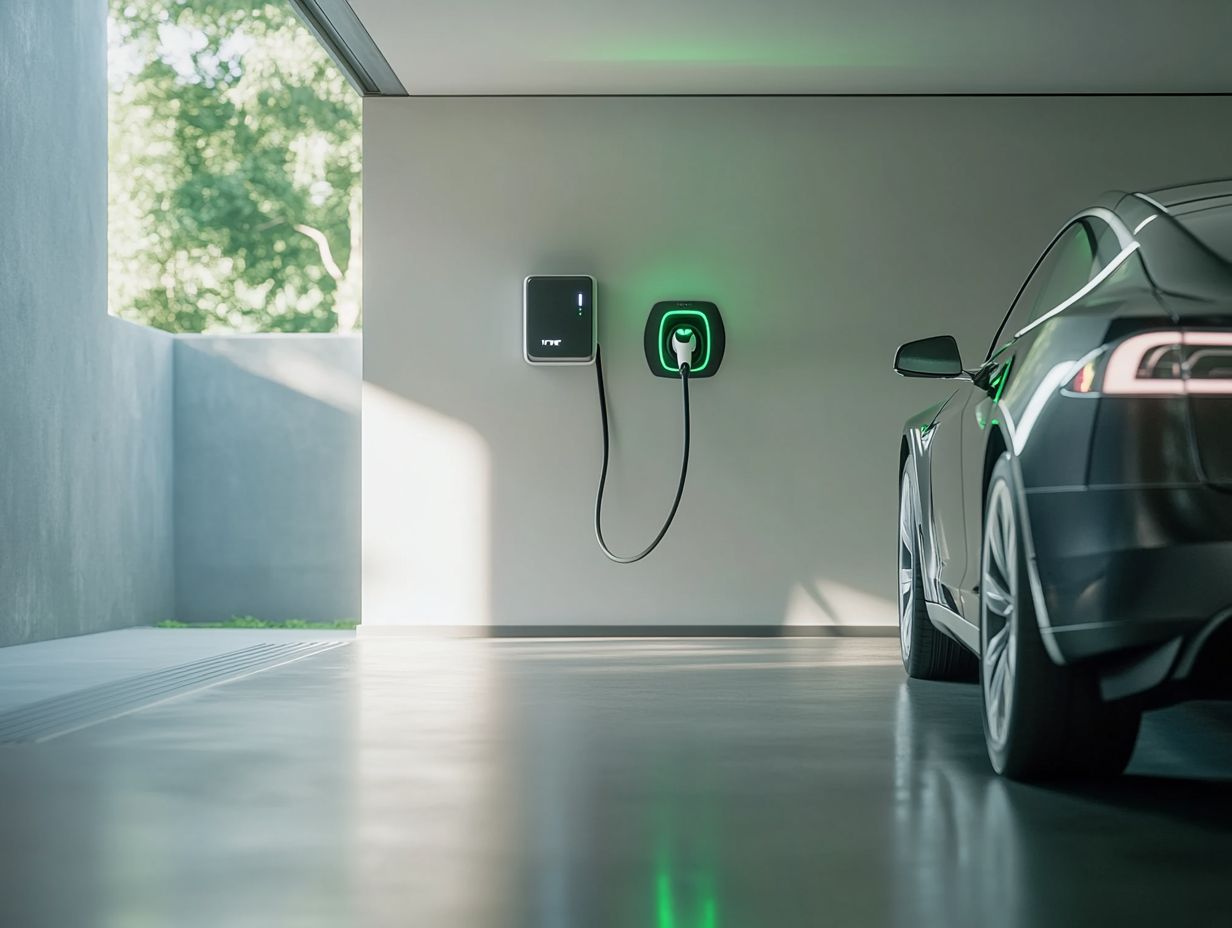
When selecting a home EV charging solution, vehicle compatibility is crucial. Different electric vehicles have unique charging requirements and connector types. Ensure your home EVSE aligns with your vehicle s specifications, whether you drive one of the most popular electric vehicles.
Be aware of the various charging standards available, such as Level 1, Level 2, and DC fast charging options. Each electric vehicle model may require different connectors, like the J1772 for most brands or Tesla’s proprietary plug.
To avoid compatibility headaches, consider investing in adapters or universal charging stations that can accommodate multiple standards. Staying informed about the latest advancements in charging technologies will enhance your charging experience, ensuring convenience and efficiency in your daily routine.
Evaluate your options now to find the right charging solution that fits your lifestyle!
Installation Requirements
Installation requirements for home EV charging solutions can vary significantly depending on the charger you choose and your home s existing electrical setup. Level 1 chargers are straightforward and require minimal setup. In contrast, if you opt for Level 2 or DC Fast Charging units, you will likely need to hire a professional for installation because dedicated electrical circuits are necessary.
Regarding a Level 1 charger, standard household outlets usually suffice, requiring only the regular voltage and amperage. If you decide to go for a Level 2 charger, which offers quicker charging, a dedicated 240-volt circuit is essential. This often means you ll need a licensed electrician to evaluate your home s electrical capacity and potentially make upgrades.
On the other hand, DC Fast Charging systems provide the highest efficiency but come with their own requirements. These systems often demand significant improvements to your electrical setup and may even require building permits, depending on local regulations. Proper installation ensures safety and compliance with local laws. Understanding these elements is crucial before starting the installation process.
Cost
The cost of home EV charging solutions includes various factors, such as the price of the charger, installation fees, and ongoing electricity expenses. While Level 1 chargers may be more budget-friendly, investing in a Level 2 charging station can yield significant savings over time through lower charging costs and enhanced convenience!
By understanding the full range of charging costs, you can make informed financial decisions that fit your long-term charging habits. Don’t miss out on potential rebates, incentives, and energy rates that can save you money now!
Installation expenses can vary based on your existing electrical setup and whether upgrades are necessary for faster charging capabilities. Exploring different charging options and schedules, such as charging during off-peak times, can reduce utility bills. By weighing these factors, you can forecast immediate costs while appreciating how strategic choices contribute to long-term savings and sustainability.
How to Install a Home EV Charging Solution
Installing a home EV charging solution is a relatively simple task, though it can vary based on your charger type and your home s electrical configuration. You might choose a DIY route or enlist a professional for the installation, depending on your comfort level and the complexity involved.
Understanding the installation process is vital for ensuring both safety and efficiency, allowing you to enjoy the benefits of home charging without any hassle.
DIY vs. Professional Installation
When it comes to installing a home EV charging solution, you face a choice: should you tackle it as a DIY project or seek help from professionals? Each option has its own advantages and challenges.
Choosing the DIY route may seem appealing if you’re looking to save money, but it also carries risks if the installation isn’t done correctly. Improper wiring, for example, can damage your EV or create serious safety hazards, like electrical fires.
Conversely, professional installation can significantly reduce these risks, often providing benefits like warranties and post-installation support. While the upfront cost may be higher, the long-term efficiency and peace of mind can make it worth every penny!
As you consider your options, carefully evaluate factors like safety, cost-effectiveness, and efficiency. Making an informed decision that aligns with your charging needs is essential for a smooth and satisfying experience.
Step by Step Guide
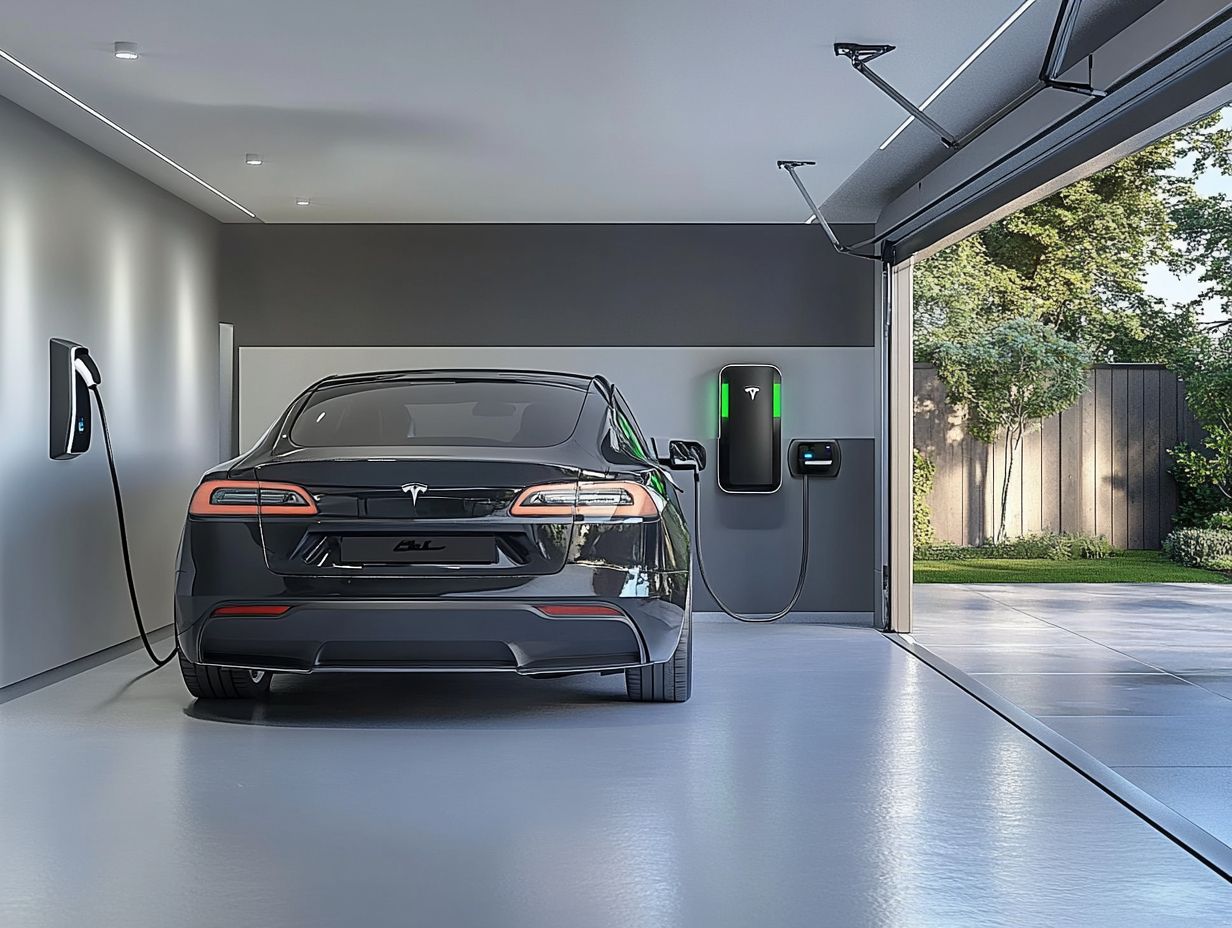
Get ready to simplify your charging routine with this easy guide! Installing a home EV charging solution can transform a daunting task into a seamless experience for you as an electric vehicle owner.
By adopting a structured approach, you can tackle challenges effectively. First, explore the various types of chargers available. Level 1 chargers use a standard outlet and are slower, while Level 2 chargers are faster and require special installation.
Once you ve selected the right equipment, assess your power supply to ensure it can handle the increased load. If not, consulting an electrician for recommended upgrades is a smart move.
When your charger is ready for installation, comply with local building codes and safety regulations. After everything is set up, test the charging functionality and monitor its performance to spot any potential issues early. This guarantees a reliable and efficient charging experience.
Frequently Asked Questions
What are the benefits of a home EV charger?
Installing a home EV charging solution lets you conveniently charge your electric vehicle at home, saving you time and money compared to public charging stations. It’s crucial to consider the importance of sustainable EV charging solutions for a more eco-friendly approach.
Are there any financial benefits to using a home EV charging solution?
Yes! A home EV charging solution saves you money over time by eliminating the need for public charging and potentially reducing your overall electricity costs.
Can a home EV charging solution improve the charging speed of my electric vehicle?
Absolutely! Home EV charging solutions typically provide faster charging speeds compared to standard wall outlets, allowing you to fully charge your vehicle in less time.
Do home EV charging solutions require any special installation or equipment?
While some setups may require professional installation, there are options available that can be easily installed by the user without any special equipment.
What are the environmental benefits of using a home EV charging solution?
Using a home EV charging solution reduces your reliance on fossil fuels and contributes to a cleaner, more sustainable environment.
Can a home EV charging solution increase the resale value of my home?
Yes! Installing a home EV charging solution can make your home more appealing to potential buyers, especially as the demand for electric vehicles continues to grow.
Ready to install your own EV charger? Let s get started!

